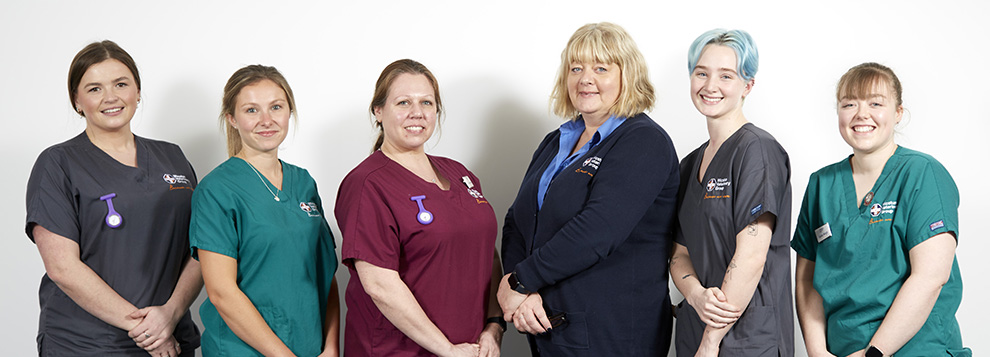Wicstun Nurse, Helena has experience and completed further studies in dealing with fearful events and has put together some advice to owners with noise phobic or anxious pets.
Firework season can be an extremely distressing time for our pets. Here are a few simple tips and ideas that can be implemented to try and minimize the effects as much as possible!
Planning ahead is key! Forward planning ahead of bonfire night and the festive season can help make this time as stress free as possible.
Top Tips
Start preparing at least 6 weeks before:
- Desensitise your pet to noise – ‘Sounds Scary’ is a free downloadable audio on the Dogs Trust website which slowly gets your pet used to loud noises such as fireworks.
- Check microchip details – A scared dog or cat is at risk of slipping their lead or bolting – this is time to check ID chip details and make sure they are up to date. Use the website ‘check a chip’.
- Secure your garden – Pets who are afraid may try and escape the noise, even if they are in their own garden. Ensure gates are shut/bolted, any gaps or escape routes are covered.
- Start using pheromone therapy – Designed to mimic cat and dog’s natural pheromones, associated with the calming and comforting of their young. We would recommend and stock Adaptil, Feliway or Pet Remedy.
Spot the signs that your pet is afraid or anxious:
- Trembling / Shaking
- Licking lips / Yawning / Refusal to eat
- Clingy behaviour / Accidents in the house
- Hiding / Pacing
- Panting / Digging
- Cowering / Hiding
- Trying to run away / Crouching to the ground
- Big pupils / Swishing their tail
- Accidents in the house
Walk in the Light – it may be that walks have to be completely missed on some night as it can take days for a dog to recover from a fearful experience. Instead try enrichment activities such as snuffle mats, stuffed Kongs etc. Make sure your pet is not left alone on bonfire night
Reduce Noise – before any fireworks start, close all windows and draw the curtains. Turn on the radio/TV. Media outlets such as Spotify and YouTube have music specifically for dogs and cats “calming music for dogs/cats”.
Create a Safe Haven – Build a den / prepare a crate. Use the room your pet feels the safest. Place own clothes in crate/bedding, use a crate or build a den behind a sofa, under tables with blankets/towels. Encourage to use a den or their crate several weeks before bonfire night. Do not shut the crate door, allow them to come out if they wish. Have treats and chews on hand to distract your pet (they may not eat but if they do it will be a good distraction)
Cats – often like to hide up high so place boxes/igloos on top of furniture. Close the cat flap if applicable.
Take Care – stressed/ anxious pets are more likely to act of impulse and their threshold for aggression will be lowered so take extra care as they may growl or bite out of character.
Reassure vs Leave Alone – if your pet seeks reassurance from you, give it, provide calm comfort. Alternatively if your pet chooses to hide leave them alone and reassurance in this case can reinforce their anxiety. Avoid any form of punishment.
Keep calm yourself as pets pick up on your own anxieties.
Medication
Mild Cases – (can be discussed with our nursing team) Zylkene (dogs and cats) – start using 1 week before fearful event (bonfire night). Zylkene contains a natural milk protein with proven calming effects and is non drowsy. Calmex (dogs and cats) – Is a calming supplement specially blended feed to promote relaxed behaviour. Give a dose once a day 3 days prior to a stressful event (tablet form for dogs/liquid for cats) Kalm Aid (dogs and cats) stimulates the production serotonin Thunder Shirts (dogs) these act as a swaddle and have good evidence that they help keep dogs calm.
Extreme Cases – if your pet is extremely affected from fireworks there is stronger prescription strength drugs the vet can prescribe but your pet will need an appointment with one of our veterinary surgeons – ideally 2 weeks before.
Please do not hesitate to call us if you would like to arrange a Nurse Clinic appointment, or in more extreme cases of anxiety, a Vet appointment may be necessary and you can speak with our team about this.






